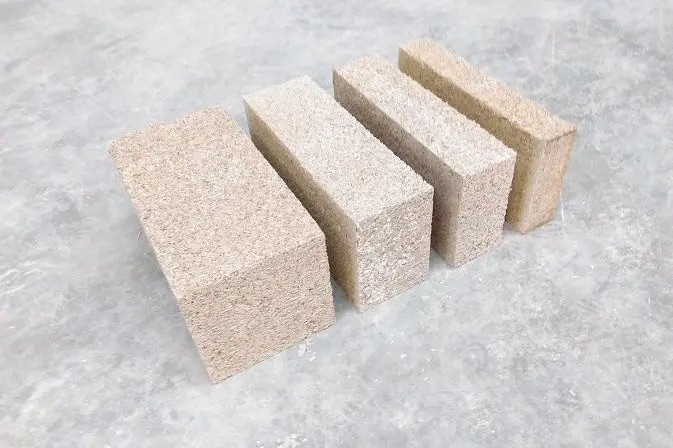Introduction
As the demand for sustainable and eco-friendly building materials continues to grow, hemp blocks are emerging as a revolutionary option in construction. Made from the core of the hemp plant, these blocks offer a renewable, durable, and fire-resistant alternative to traditional building materials like concrete and brick. This guide explores what hemp blocks are, their benefits, and how they are reshaping the future of sustainable construction.
What Are Hemp Blocks?

Hemp blocks are construction materials created from the inner woody core (hemp hurds) of the hemp plant, mixed with a lime-based binder. The mixture forms lightweight, non-load-bearing blocks ideal for insulation and can be combined with a supporting structure, such as timber.
Composition of Hemp Blocks
- Hemp Hurds: The woody core of the hemp plant is shredded into small pieces, providing the primary material for hemp blocks.
- Lime-Based Binder: Lime serves as a natural binder that hardens over time, creating a strong, durable, and fire-resistant block.
- Water: Used to mix the hemp hurds and lime-based binder into a paste, which is then molded into blocks and allowed to cure.
Benefits of Using Hemp Blocks
1. Environmentally Friendly
Hemp is a highly sustainable crop, growing quickly with minimal water, pesticides, and herbicides. Hemp blocks are made from renewable resources, and their production has a much lower carbon footprint compared to traditional materials like concrete or brick. Additionally, as hemp plants grow, they absorb significant amounts of CO2, making hemp blocks a carbon-negative building material.
2. Excellent Insulation Properties
Hemp blocks offer superior thermal insulation, helping to maintain consistent indoor temperatures and reduce energy consumption. This insulation property means buildings made with hemp blocks stay cooler in the summer and warmer in the winter, leading to significant savings on heating and cooling costs.
3. Breathability and Moisture Regulation
Hemp blocks are highly breathable, allowing moisture to pass through without building up. This prevents dampness, mold, and mildew, contributing to a healthier indoor environment. Their ability to regulate humidity also enhances their insulation properties.
4. Durability and Fire Resistance
Hemp blocks are naturally fire-resistant, primarily due to the lime-based binder. The lime does not combust and prevents flames from spreading, providing a significant safety advantage over many traditional building materials. Hemp blocks have been tested to withstand high temperatures, making them an ideal choice for construction in fire-prone areas.
5. Acoustic Insulation
The porous structure of hemp blocks absorbs sound, making them excellent for soundproofing. They reduce noise pollution and create a quieter, more peaceful indoor environment, making them ideal for urban areas or locations exposed to high noise levels.
Applications of Hemp Blocks
Hemp blocks can be used in various construction applications, such as:
- Wall Insulation: Ideal for non-load-bearing walls or as infill material in timber-framed buildings to provide insulation and moisture regulation.
- Floor Insulation: Laid under floors to improve thermal and acoustic insulation.
- Roof Insulation: Used in roof construction to enhance thermal performance and reduce energy costs.
- Partition Walls: Perfect for internal partitions due to their lightweight nature and excellent soundproofing properties.
How Hemp Blocks Are Made
The production of hemp blocks involves several essential steps:
- Harvesting the Hemp Plant: The hemp plant is harvested, and the stalks are processed to separate the outer fibers from the woody core (hurds).
- Shredding the Hemp Hurds: The woody core is shredded into small pieces suitable for construction.
- Mixing with Lime Binder: The shredded hemp hurds are mixed with a lime-based binder and water to form a thick paste.
- Molding into Blocks: The mixture is poured into molds to form blocks of the desired size and shape.
- Curing: The blocks are left to cure and harden over several weeks. During this time, the lime reacts with air, hardening and creating a strong, durable, and fire-resistant block.
Fire Resistance: A Key Advantage
One of the standout benefits of hemp blocks is their fire resistance. The lime binder used in hemp block production creates a non-combustible barrier that slows the spread of flames. Hemp blocks have been tested under rigorous fire safety standards and are shown to have a high fire resistance rating, withstanding high temperatures and maintaining their structural integrity longer than many traditional materials. This makes them especially suitable for buildings in fire-prone areas.
Conclusion
Hemp blocks offer a sustainable, eco-friendly, and fire-resistant alternative to traditional building materials, combining durability, excellent insulation, and fire safety. As the world shifts towards more sustainable construction practices, hemp blocks are poised to play a significant role in the future of building. Their numerous benefits make them an ideal choice for environmentally conscious builders and homeowners looking to create safe, energy-efficient, and green structures.



